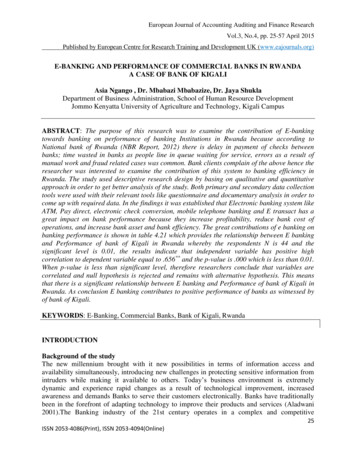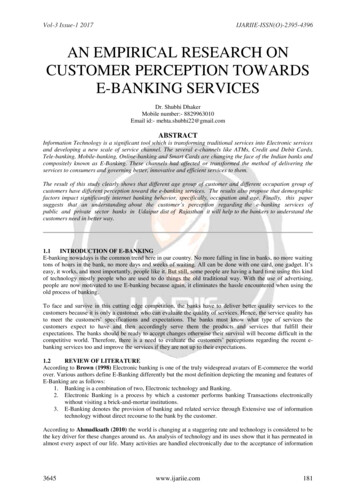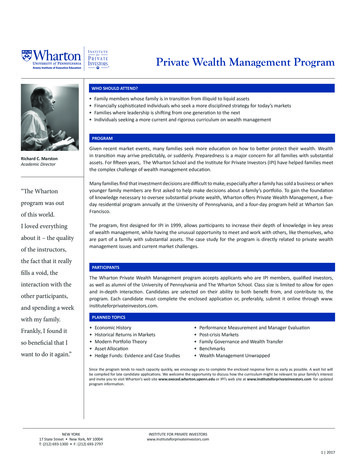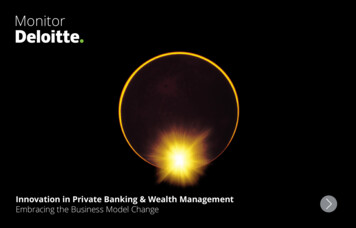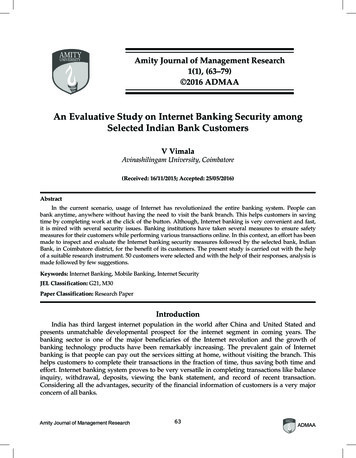
Transcription
Wealth Management & Private BankingMarket OverviewOctober – December 2018
Market Overview Wealth Management & Private BankingContentsMarket UpdateKey trends and market news in the Wealth Management industry globally. 3 – 5Banks’ NewsBanks’ structural changes, M&A activities, expansion and hiring trends by institution. 6 – 10Key MovementsKey appointments for the period October to December 2018.11About UsOur biographies, practice overview and contact details. 172
Market Overview Wealth Management & Private BankingMarket UpdateKey trends and market news in the Wealth Managementindustry globallyUK Renews its Attack Against OffshoreTax Evasion The U.K. Treasury plans to publish a new compliancestrategy around the overseas entities that wealthyindividuals use to conceal their assets, building on whatthe government called a “substantial progress that theU.K. has made in tackling offshore tax evasion” sincethe last plan in 2014. Fighting offshore tax evasion has increasingly becomea priority for governments in the wake of public dataleaks such as the Panama Papers, as almost half ofthe companies cited through that leak of 11.5 milliondocuments were registered in the British Virgin Islands(U.K. territory). In addition, the Panama Papers citedalmost 2,000 U.K.-based intermediaries that helpedindividuals or entities to evade tax. Alongside a new compliance strategy, the U.K.government is seeking to widen its data-sharing powersas part of the fight against tax evasion. Its high-networth unit, focusing on the tax affairs of rich individuals,has brought in more than 1 billion pounds ( 1.3 billion)since it was set up in 2009.Guernsey of Increased Attractivenessfor Family Offices Guernsey is increasingly being considered as a basefor family offices. David Bowen, Head of Deloitte’sPrivate Office Consulting practice, commented:“We are starting to see a shutdown of jurisdictionswhich people would have typically looked to use, andthey are relocating trusts or shoring up substancerequirements where trusts are involved.The focus is to move away from areas seen as tax havensto areas with a more robust framework, and a real focusand defensibility around using the locations”. One of the biggest fears for families is to be hacked,which can lead to the destruction of wealth, and thesefamilies are looking to protect themselves better fromdata and cyber protection. Guernsey’s commitment to tax transparency and sharinginformation, while still offering privacy by refusing toadopt public registers of beneficial ownership, is veryimportant. Guernsey is already improving its family officecapabilities to attract more business, by refining its legaland regulatory approach to provide the most supportiveglobal environment and ecosystem for servicing privatecapital and wealth, and to meet the evolution takingplace in the world of the family offices.MiFID II and Multi-family Offices Many MFOs have underestimated the challenges thatMiFID II would bring to them. Preparation was lastminute at best, at worst nonexistent. Many believed thatthe directive was not directly relevant to them and thatit would only impact larger financial institutions. But ofthe 9,000 firms affected by Mifid II, 6,500 are small-tomedium enterprises, and many of these are MFOs. Close to one year after implementation, little haschanged. Preparedness remains low among MFOs,in part due to a belief that regulators are failing to crackdown on non-compliance; an unsurprising reactiongiven the wave of criticisms directed at the FCA for itslimited interest in fining big banks and asset managersfor non-compliance. Just six firms have so far reportedthemselves to the regulator.3
Market Overview Wealth Management & Private Banking As MFOs often deal with a significant amount ofdifferent financial players, their obligations under MifidII are highly challenging. Amongst the many demands,transaction reporting requires MFOs to keep records ofall conversations, activities and communications theyhave engaged in, storing in a digitised, tamper-proofformat to be made available at the regulator’s requestwithin 72 hours.GCC Wealthy Clients Poorly Preparedfor Wealth Transitions According to a recent survey by Jersey Finance’s newoffice in the DIFC, 92% of HNWI GCC clients are poorlyprepared and inadequately structured for the transitionof wealth across generations. There is an estimated 1 trillion of wealth set totransition between families and generations in theMiddle East during the next decade, which providesimmense opportunities for wealth managementcompanies in the region. According to the research,prepared in conjunction with Hubbis, there is a growingpreference from HNWI clients to professionalize the waysuccession planning is managed, despite the lack ofpreparedness. Offshore jurisdictions that can demonstrate theirdedication to transparency, ethics, and quality will surviveand prosper in this changing environment. The use ofoffshore jurisdictions is highly driven by the geopoliticalclimate and fears of instability (25%) and successionplanning (25%) followed by privacy and confidentiality(17%), asset protection (17%), tax efficiency (8%), anddiversification of jurisdictions and assets (8%). According to the findings, HNWI clients in the MiddleEast understand that the selection of an InternationalFinancial Centre is critical, with reputation being themost important factor. As such, there is a clear trendtowards Tier 1 IFCs that are noted for their expertise,regulatory robustness and transparency. The report further said that the more sophisticatedHNWI clients in the GCC are concerned about the costof having multiple structures in multiple jurisdictions,according to one third of respondents. 75% of industryexperts agree that clients are looking to increasinglyconcentrate their assets and structures in one center. Offshore corporate structures and private trustcompanies appear to be the preferred options for thecore of GCC HNWI wealth structuring, while truststructures are considered the next most important,alongside citizenship and residency planning.Dubai International Financial Centre(DIFC) Growing Strong The DIFC is revamping its wealth management offeringin the free zone, to attract wealthy families from allover the world to base their family offices and wealthmanagement structures there. The ruler of Dubai, His Highness Sheikh Mohammedbin Rashid Al Maktoum, announced new laws in Marchthat enhance the existing DIFC trust legislation in linewith international best practice, including promotingbetter trust administration and giving greater certaintyand flexibility to settlors, trustees and beneficiaries.It also introduces a completely new regime for themarket, promoting better creditor protection, successionplanning and lifetime private wealth planning for familybusinesses. Both form part of the DIFC’s ambitious 2024 growthstrategy, by which time it hopes to be the leading centrefor private wealth management and one of the world’stop 10 financial centres. In the old days, trusts were seenas a hiding place for assets, but now they are seen asa sensible approach to managing and owning wealth,particularly for the benefit of families. Sheikh Mohammed also introduced new residency lawsin the UAE this year to make it possible for professionalexpats to obtain ten-year visas, rather than the currentthree-year ones. The aim is to attract wealthy investors,entrepreneurs and workers to put down roots. According to BSA Ahmad Bin Hezeem & Associates LLP,adviser to HNWIs and Corporates on UAE and DIFC laws,a lot of people are relocating to Dubai and restructuringtheir assets internationally, taking advantage of thedouble tax treaties between Dubai and the rest of theworld. For example, the Dubai government has madeconsiderable efforts to attract Chinese citizens in the last24 months, including allowing visitors to be granted visason arrival in the same way that European citizens are. 12 trillion in Sustainable InvestingAssets in the US A recent report by the US SIF Foundation (2018) foundthat sustainable, responsible and impact investingassets have expanded to 12.0 trillion in the US, aboutone fourth of the 46.6 trillion in total assets underprofessional management in the country. This is up38% from 8.7 trillion in 2016. Much of this growth is driven by asset managers,who now consider environmental, social or corporategovernance (ESG) criteria across 11.6 trillion in assets,up 44% from 8.1 trillion in 2016. According to thefindings of the report, the top three issues for assetmanagers and their institutional investor clients areclimate change/carbon, tobacco and conflict risk. From 2016 through the first half of 2018, 165institutional investors and 54 investment managerscontrolling 1.8 trillion in assets under management(AUM) filed or co-filed shareholder resolutions onESG issues.Surging Number of Billionaires in China According to the latest UBS/PwC Billionaires Report(2018), total assets of all billionaires globally increasedby almost 20% to 8.9 trillion over the past year:4
Market Overview Wealth Management & Private Banking The number of Chinese billionaires has risen to 373in 2017 from 318 in 2016. Their assets increased by39% to 1.12 trillion. The growth rate in the wholeof APAC was 32%. China created two billionaires each week, while Asiaas a whole made three new billionaires per week. Butas business remains risky in the region, China also lostone billionaire per week (106 new billionaires vs. 51ex-billionaires). North and Latin America lagged the world’s growthrates, with an increase in assets of 12%, reaching atotal of 3.6 trillion. Thanks to a strong currency development, WesternEurope had strong wealth growth over the pastyear. Assets increased 19%, while the number ofbillionaires only rose 4% to 414. Over the last decade, Chinese billionaires have createdsome of the world’s largest and most successfulcompanies and hugely raised living standards. Of allChinese billionaires, 97% are self-made. Last year,89 Chinese businessmen made their first billion dollars,three times more than in the U.S. and EMEA. The family office is a relatively new concept in Asiaand, although there is no accurate data available, it isestimated that there are less than 400/500 of such firmin the entire region, compared to thousands in the Westwhere wealth held by the population is of much olderorigins. The activity of setting up family offices this year hasbeen substantially more than the previous one, andthis growth should continue on the current pace. It isestimated that the number of new family offices inAsia rose by 15% in the first three quarters of this yearcompared to the same period last year. This momentumwas aided by the boom in Hong Kong for initial publicofferings which saw record money raised mostlyby Chinese tech firms, turning many founders intomillionaires and billionaires. Asian family offices are evolving from being justinvestment focused to offering a platform for disputeresolution and succession planning, as the newgeneration in the family-owned businesses expand intonewer areas. To capture this growth, the big four Chinese banks(ICBC, Agricultural Bank of China, Bank of China andChina Construction Bank), have all recently announcedestablishment of wealth management units within theirbusiness operations.Family Offices Sprouting in Hong Kongand Singapore The number of family offices in Hong Kong andSingapore quadrupled between 2015 and 2017according to the Monetary Authority of Singapore whichadded that those funds can benefit from a number ofattractive incentives, such as tax breaks and residencybeing offered to them.5
Market Overview Wealth Management & Private BankingBanks’ NewsBanks’ structural changes, M&A activities, expansion andhiring trends by institutionLebanese financial group Bank of Beirut has announcedthe acquisition of Luxembourg-based FortunaBank, which will allow expansion in the Grand Duchy.The Lebanese banking group, which offers commercial,corporate, private, investment, asset management andretail banking, has already set foot in Europe, runningoffices in the United Kingdom, Cyprus and Germany.The management and 26-member staff of Fortuna Bankwill keep their functions and continue to service local andregional customers. Fortuna offers a tailor-made bankingservice to clients and also funds real estate projects andoffers investment services to a wide range of private andcorporate clients.Barclays started moving its European coverage privatebankers to Dublin in anticipation of Brexit. Whilst somebankers have already moved, the rest will move in tranchesup to March 2019. The bank is also expected to change thebooking centre for several clients from London to Dublin.Most relationship managers have been offered a 30% hikein compensation. The move will not affect relationshipmanagers who cover Swiss clients, as they are expectedto be largely unaffected by the U.K’s decision to exit theEuropean Union.BNY Mellon Investment Management (BNY Mellon IM)has expanded it’s presence in Nordics with its firstoffice in Stockholm, Sweden. The office opening will seeBNY Mellon IM offer its suite of investment specialists toinstitutional and intermediary clients in Sweden, Denmark,Finland, Norway and Iceland. The office is led by JohanStromberg, head of Nordic distribution at BNY Mellon IM,who joined the firm in October 2017 and supported byViktoria von Kunow, director of Nordic distribution, whojoined the firm in June 2018.Citigroup is planning to reposition some roles at itsSouthern European private-banking team fromLondon to Madrid. The choice may reflect the fact thatmany of Citi’s executives in private banking are Spanish,including regional team leader Fernando Lopez Munozwho moved to Madrid from London earlier this year. Histeam also serves ultra-high net worth clients in Italy, Turkey,Portugal and Greece. The firm is planning to have its newbroker-dealer in Frankfurt up and running by the end ofthis year in case negotiations break down without a tradedeal or transition agreement. The bank plans to relocatearound 150 roles to the new hub, many of which will behired locally. Citigroup is also planning to relocate roles tooffices in Milan, Paris, Dublin and Luxembourg. The Nordicand Benelux coverage teams are said to be moved toLuxembourg.Credit Suisse has pulled out of South Africa after morethan a decade as part of chief executive Tidjane Thiam’srevamp, quitting a country whose economy has slippedinto a recession for the first time since 2009. Credit Suisse,which had around 30 staff at its Johannesburg office,re-entered South Africa in 2006 after leaving in the 1980s6
Market Overview Wealth Management & Private Bankingunder pressure from anti-apartheid campaigners. Thebank has now decided to close the office and terminateits physical presence in the region. The bank will keepoffering private banking services for South Africaswealthy clients from London, Zurich and Dubai andits research teams in these cities will continue to coverselected blue-chip South African companies.DBS, Southeast Asia’s largest bank, has announced thatit is planning to almost double its Dubai privatebanking staff (from the current 11 to 20) in its bid totriple revenue for its operations in the Middle East by2023, capitalising on a shift of investments towardsAsia. The bank is joining Citi and other global lendersexpanding wealth management operations in the region.The prospective client base includes wealthy Middle Eastbusiness people, family offices and non-resident Indians,as the bank identifies a shift in investments for thisclient base to Asia, from previous preferred locations ofSwitzerland, USA and UK.Deutsche Bank PWM has launched a multi-asset fundin Spain that applies a scientific approach to limit risk andtake better advantage of the investment opportunitiesof the equity market. DB PWM I-A3 Portfolio-Plus 10 is adiversified and global multi-asset fund that protects theportfolio through the systematic analysis of probabilitiesand the implementation of permanent non-conditionalcoverage, which limits the potential loss to 10%. Thisstrategy brings the possibility of increasing the equityexposure more than other investment solutions takingsimilar risks. The Fund is aimed at Deutsche Bank’s PrivateBanking and Wealth Management clients, with a minimuminvestment of 10,000. It invests worldwide in equities,fixed income, commodities and cash, including foreigncurrency transactions, and with a minimum time horizon offive years.EFG International is relaunching its domestic Italianbusiness and the bank has appointed Giorgio AngeloGirelli as the new head of its Milan branch, effective 01December 2018 and subject to regulatory approval. AngeloGirelli will be responsible for relaunching and furtherdeveloping EFG’s business with Italian clients, which thebank defines as an important strategic area of focus. Hewill report directly to Franco Polloni, head of Switzerland& Italy Region. Italy’s central bank had threatened to shutdown EFG’s Italian offices early last year (Milan and Como),due to an investigation over compliance failings due toBSI. These were revoked at the end of last year when EFGdecided to shut the Como office and invest in relaunchingin Milan.Swiss Banque Heritage and Sallfort Privatbankannounced that they will merge as of January 2019,combining banks controlled for generations by familieswho prospered in commodities trading. The merged entitywill manage 6 billion Swiss francs (4.5 billion pounds)of assets and operate under the Banque Heritage name.The number of Swiss private banks has fallen sharplyover the last decade as lenders to the world’s wealthiestpeople contend with tougher regulations and a changedenvironment following a global clampdown on tax evasion.The combined bank will remain based in Geneva andemploy 120 staff in Switzerland. Marcos Esteve, CEO ofBanque Heritage, will be chief executive and JohannesT. Barth deputy CEO. Paul-Andre Sanglard, Chairman ofthe Board at Banque Heritage, will be Chairman of thecombined entity and Carlos Esteve, the Founder, willbecome Vice Chairman.HSBC profits rose 28% in the third quarter of this year,as the bank reined in spending and wealth managementincome picked up for the firm. The wealth managementdivision’s profits were up 3% to 100m ( 78m) yearon year over the nine months to date. The bank seeks toexpand its private banking business in Germany, witha focus on the ultra-high net worth segment, building anew team which will cater to entrepreneurial families andothers with liquid assets starting at 30 million euros ( 34million). The bank targets EUR 30bn AUM. Last year, theunit collected almost two billion euros in new money whileassets under management reached an all-time high of EUR28.5bn.In Asia, HSBC Private Banking is planning to increaseits revenues by 1bn by 2020, as part of a re-focusing bythe global bank on its Asian origins, setting out to targetAsian wealth by increasing its client-facing headcount by65% over five years and a doubling of client assets in eightyears. HSBC will focus on HNWIs based in Singapore andHong Kong, as part of a regional effort that is starting torefocus on markets in Thailand, Malaysia and Indonesiaalso. It is allocating 100m in fintech development acrossthe SE Asia region.Intesa Sanpaolo Private Bank is opening a representativeoffice in Bahrain, and it has just been granted arepresentative office license to Bank of Intesa SanpaoloPrivate Bank (Suisse) to operate in the Kingdom of Bahrain,Switzerland’s Intesa Sanpaolo Private Bank (Suisse) wasestablished in 2001 and is fully owned by Italy’s IntesaSanpaolo.J. Safra Sarasin has announced the successful completionof the acquisition of Bank Hapoalim’s private bankingbusinesses in Luxembourg and Switzerland and there-establishment of a physical presence in Israel. Theacquisition includes the transfer of qualifying clients and7
Market Overview Wealth Management & Private Bankingtheir relationship management teams who are focused onprivate banking clients primarily from Europe and Israel.The Group’s growth strategy is also taking another stepforward with the start of activities of J. Safra Sarasin AssetManagement (Israel) Ltd, a company licensed by the IsraelSecurities Authority (ISA), together with the opening of aRepresentative Office, both located in Tel Aviv.The Swiss private banking group is in the process ofopening three new offices, and close in two countries. Thebank will open its first offices in Belfast in the new year,and this will make the wealth manager the first Swiss bankto be permanently based here. It will require its clients tohave a minimum of 1m to invest. This adds to the otherUK offices in Leeds, Manchester, Edinburgh and Glasgow.The bank is also set to open a new representative officein Mexico and Manuel Torroella Velazquez will join fromMonex Grupo Financiero to take charge of the unit. He haspreviously headed HSBC Private Bank in Mexico. BeatrizSanchez, the new boss of Latin America at the Swiss-basedprivate bank who formerly Headed the Latin Americanbusiness for Goldman Sachs, has decided to refocus thebank’s Latin American growth strategy on Mexico,Brazil and Argentina. The firm has had a foothold inMexico since 2015 through its stake in NSC Asesores, alocal wealth management company. The bank is also inpreliminary negotiations to launch in Miami, and intends toexpand presence in Chile and Colombia through alliances.Johannesburg is the third new location the bank isopening, going after high-net worth individuals. The bankwill employ seven people in South Africa, five of whichhave been lured from local lenders including FirstRandGroup Ltd. subsidiary Rand Merchant Bank.On the other side, Julius Baer’s Panama and Peru officesare to be shut down following a strategic review of itsLatin American unit by Beatriz Sanchez, that found the twocountries unsuitable for building scale. The bank has notrevealed any timeline for the move, which will impact sixRMs as well as support staff who will now be transferredto the Bahamas, Chile or Switzerland and will continue toservice their existing clients in Panama and Peru.Business units-wise, Julius Baer has launched a newdedicated unit to cater to financial advisers and otherprofessional clients. The division will be led by boardmember and current head of advisory solutions PhilippRickenbacher, who will become head of intermediariesand global custody. He has worked with the company fornearly a decade, previously serving as Head of StructuredProducts.In Japan, Nomura Holdings has announced that ithas completed the investment in Julius Baer WealthManagement, a wholly owned subsidiary of Julius BaerGroup, which was announced three months ago. JuliusBaer’s name has been changed to Julius Baer NomuraWealth Management.Switzerland-based private bank Lombard Odier isexpanding its services to the South African market,targeting clients looking to diversify their portfoliosoffshore. The bank will provide advisory and related servicesto the country’s high net-worth clients. It established arepresentative office in SA in June 2017 and was recentlyawarded a category one licence from the industry regulatorwhich will enable it to provide advisory services. Each clientin SA will have access to a dedicated investment advisorbased in Geneva.Maybank has partnered with Schroders’ Singaporearm to develop a range of specialist investment solutionsthat will tap into the growing wealth market in Malaysia.The first step in this collaboration will be the launch oftwo discretionary portfolios: Global High DividendEquity Portfolio and Global High Conviction Portfolio. Theseportfolios will be managed by Maybank Asset ManagementMalaysia (MAM Malaysia), with Schroders Singapore asthe investment adviser. As part of the partnership, MAMGand Schroders will undertake further collaboration projectsin 2019 to co-develop solutions across other asset classes,including Shariah-compliant investments and private assetsamong others.Natixis Wealth Management has announced theacquisition of Massena Partners, an asset managementand investment consulting company serving UHNWcustomers with a 23-member team based betweenLuxembourg and Paris. This will help the French bank todevelop its wealth management business in France andLuxembourg. Massena Partners will become a subsidiaryof Natixis Wealth Management, that will keep its operativeautonomy in the management of its customers and in thechoice of its investments.The trust arm of private bank Rothschild & Co is beingbought out by its management. The firm is selling itswealth planning and trust arm to Richard Martin, a seniorexecutive at the unit, and to an unnamed investor. Financialdetails of the move are not disclosed. A senior team fromthe trust arm will support Martin in the managementbuyout. The trust arm was the source of embarrassinghead-lines recently when Switzerland’s regulator found itnegligent in dealing with 1MDB funds in July. The deal isexpected to close in the first quarter, and the trust is stillto unveil a new brand for itself, but Martin commentedthat the trust business will continue to work closely withRothschild following the split.8
Market Overview Wealth Management & Private BankingSantander is working on a deal with Julius Baerto acquire part of Julius Baer’s Latin Americanbusiness. Under the agreement Santander would takeover a portion of the Swiss bank’s client accounts inthe region following a review period. Details are notdisclosed at this stage but is understood the accountsin question are managed out of Switzerland and thatthe deal could be focused on Venezuelan clients. Thesources were unable to confirm the size of the clientassets that are under discussion. This is in line with Baer’sdecision of no longer serving clients from Venezuelafollowing a review of its Latin America business.Schroders and Lloyds have confirmed the launch awealth management strategic partnership in mid2019, with Schroders running 80bn of the ScottishWidows mandate cancelled with current managerStandard Life Aberdeen, as James Rainbow, Co-Headof UK intermediary at Schroders, is appointed ChiefExecutive of the joint venture. In an announcement tothe stock exchange, the groups said they are enteringinto a strategic partnership to create a “market-leadingwealth management proposition” that will combineSchroders’ investment and wealth managementcapabilities with Lloyds’ client base, distribution anddigital capabilities. Lloyds will own 50.1% of theshare capital and Schroders the remaining 49.9%.In addition, Lloyds will transfer approximately 13bnof assets and associated advisers from its existingwealth management business to the JV, and Schroderswill transfer 400m from its UK wealth managementbusiness. There will also be a referral agreement inplace to enable Lloyds’ customers to make use of theproposition.Schroders can now offer global investment servicesdirectly to South African clients as it has beengranted a Category 1 Financial Services Provider (“FSP”)licence. As well as an FSP licence, Schroders have anumber of funds approved for distribution in SouthAfrica by the FSCA. The regulator has recently approveda fifth fund, the Global Smaller Companies Fund, underits Luxembourg domiciled Schroders InternationalSelection Fund (SISF) series. Schroders has beendeveloping its South Africa business over the past fiveyears and they have had a permanent presence in thecountry since December 2015.Standard Chartered has launched a new messagingsystem for private and priority banking clients, whowill now be able to interact with their Private Bankers toshare banking-related and personal information within anew mobile application. With secure instant messaging,clients can start a chat while on the go to discuss theirbanking and investment decisions. They will also beable to do video and voice calls and conferences withtheir private bankers and RMs, and invite additionalinvestment advisors or specialists as needed. In addition,there is a real-time file sharing feature for StandardChartered’s investment publications and outlook notes,with insights customised to a client’s portfolio.St James’s Place has announced that its assets undermanagement topped 100billion, despite recentgrowing uncertainty in the financial markets. The FTSE100 firm, which offers advice on investments, pensionsand tax to wealthy retail clients, saw the net inflow offunds of 7.58billion in the nine months to the end ofSeptember, up 15% on the same period last year. Theincrease and client retention rate ‘strong’ at 96% tookfunds under management to 100.6billion (up 11%since the beginning of the year and 17% higher over a1-year period).Stonehage Fleming and Glenmede Trust Companyhave entered into a strategic alliance, which hasalready started, and will allow both firms to expand theirrespective client offerings and geographical capabilities.They both remain independently managed and privatelyheld. The relationship will allow Stonehage Fleming todeliver international family office, trust, and investmentservices to clients of Glenmede in Europe, Middle Eastand Africa, and Glenmede to offer investment andcorporate trust services to clients of Stonehage Flemingin the US.Banque Syz is working on succession plans, and thesons of founder Eric Syz are both in line to takeover the Genevan private bank. Eric, who is thecurrent CEO of the bank he founded in 1996, hasstarted planning retirement and succession. In April,Syz named Yvan Gaillard as his deputy, and his twosons have also
planning and lifetime private wealth planning for family businesses. Both form part of the DIFC's ambitious 2024 growth strategy, by which time it hopes to be the leading centre for private wealth management and one of the world's top 10 financial centres. In the old days, trusts were seen



